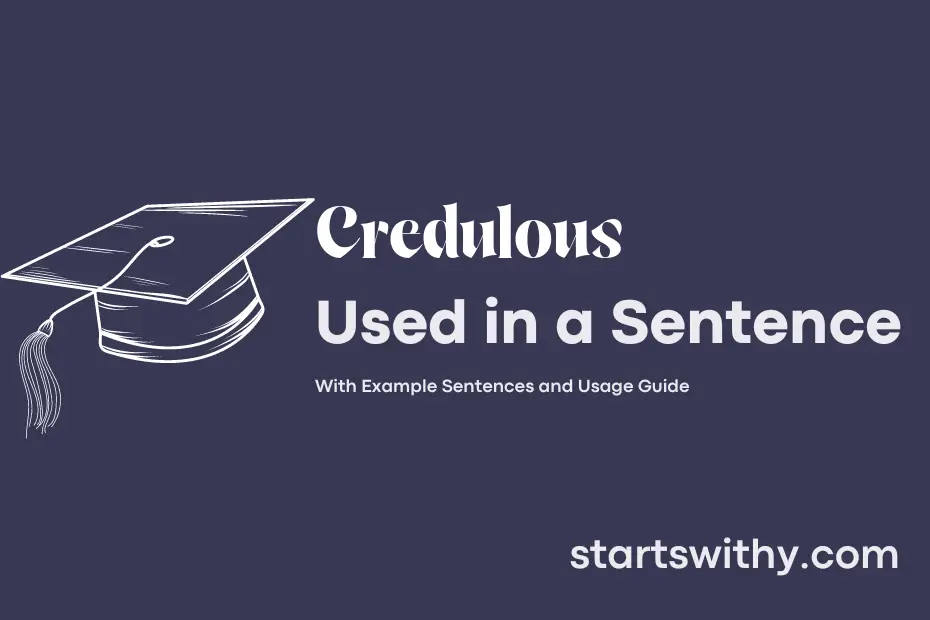Ever wondered how to spot if someone is gullible or easily deceived? Understanding the term “credulous” can help distinguish those who are prone to believing anything without questioning its validity.
Credulous, simply put, means having a tendency to believe things too easily, especially without sufficient evidence or critical thinking. It often describes individuals who are more inclined to accept information at face value, making them susceptible to manipulation or deception.
7 Examples Of Credulous Used In a Sentence For Kids
- Credulous people believe everything they hear.
- It’s important not to be too credulous and question things.
- Some people are very credulous and trust others easily.
- Remember to ask questions and not be too credulous.
- Good friends will not take advantage of your credulous nature.
- It’s okay to be credulous sometimes, just be careful.
- Being credulous can sometimes lead to making mistakes.
14 Sentences with Credulous Examples
- Credulous students often fall prey to misinformation spread on social media.
- It’s important for college students to question sources and not be too credulous when it comes to academic research.
- Some professors take advantage of credulous students by assigning unnecessary projects.
- It’s common for credulous freshmen to believe everything they hear during orientation week.
- Avoid being too credulous when signing up for extra-curricular activities that require a financial commitment.
- Credulous students are more likely to be swayed by peer pressure when making important decisions.
- Research shows that credulous individuals are more susceptible to falling for scams.
- Don’t be too credulous when it comes to campus rumors – always fact-check before sharing information.
- Credulous students may struggle to differentiate between credible and unreliable sources of information.
- Beware of recruiters who prey on credulous graduates looking for job opportunities.
- It’s essential for college students to develop critical thinking skills to avoid being overly credulous.
- Aspiring entrepreneurs should be cautious of being too credulous when seeking investment opportunities.
- Credulous students are more likely to believe in superstitions and myths without questioning their validity.
- Don’t let your peers take advantage of your credulous nature – stand firm in your beliefs and decisions.
How To Use Credulous in Sentences?
Credulous means being gullible or overly trusting. When using it in a sentence, remember that it is an adjective that describes someone who is too willing to believe something without enough evidence.
Here’s an example sentence using credulous: “The credulous tourist fell for the scam and lost all his money.”
To incorporate credulous in a sentence, start by identifying a person or group who is easily convinced or fooled by others. Then, describe their actions or beliefs that demonstrate their gullibility. Remember to use credulous correctly with nouns that can be described as naive or easily swayed.
Avoid confusing credulous with similar words like “credible” or “incredible.” While credulous describes a tendency to believe things too easily, “credible” refers to something that is believable or trustworthy, and “incredible” means something that is hard to believe due to being extraordinary.
In your writing, using credulous can help convey a lack of skepticism or discernment in a person’s behavior or decisions. By understanding the meaning and context of the word, you can effectively communicate a sense of naivety or blind trust.
Practice using credulous in various sentences to become more comfortable incorporating it into your vocabulary and writing.
Conclusion
In conclusion, the examples of sentences utilizing the keyword “credulous” underscore the importance of critical thinking and skepticism in evaluating information or claims. Individuals described as credulous are often depicted as gullible or easily swayed by false or misleading statements. It is crucial to be cautious and discerning in order to avoid being exploited or misled by those who may take advantage of a credulous nature.
By recognizing and addressing our own tendencies towards credulity, we can cultivate a more discerning approach to new information, protecting ourselves from potential exploitation and misinformation. Developing a healthy dose of skepticism while remaining open-minded can help us navigate a world filled with misinformation and ensure that we make informed decisions based on facts and evidence rather than blindly accepting everything we hear.



